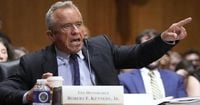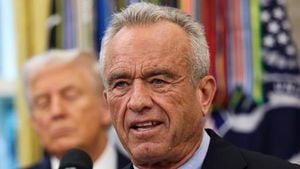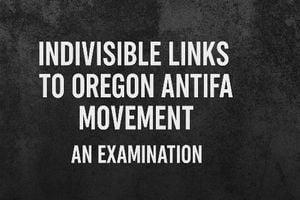Tempers flared in Washington last week as Health and Human Services Secretary Robert F. Kennedy Jr. unveiled a sweeping new report on childhood chronic illness and then faced fierce scrutiny from both sides of the political aisle during a heated Senate hearing. The events, which unfolded on September 9 and 4, 2025, respectively, have thrust Kennedy and the Trump administration’s health agenda into the national spotlight, exposing deep divisions over the future of public health policy in America.
According to Scripps News, Kennedy’s Make America Health Again (MAHA) Commission released a report that lays much of the blame for rising rates of chronic illness among children on poor diet, exposure to toxic chemicals, lack of physical activity, and what Kennedy calls “overmedicalization.” The report paints a grim picture: American youth, it claims, are suffering from unprecedented levels of obesity, diabetes, cancer, and mental health disorders. Kennedy describes this as “the sickest generation in American history.”
“The Trump Administration is mobilizing every part of government to confront the childhood chronic disease epidemic,” Kennedy declared in a statement obtained by Scripps News. “This strategy represents the most sweeping reform agenda in modern history—realigning our food and health systems, driving education, and unleashing science to protect America’s children and families. We are ending the corporate capture of public health, restoring transparency, and putting gold-standard science—not special interests—at the center of every decision.”
The MAHA report proposes a range of responses, including advancing research into the causes and solutions for childhood illness, enacting policy reforms, deregulating certain industries, restructuring agencies, and launching a new public awareness campaign. One notable recommendation is the creation of the Administration for Healthy America (AHA), a new body dedicated to addressing chronic disease. Yet, despite its ambitious tone, the report stops short of calling for major regulatory changes or outright bans on specific chemicals—a point that has frustrated some advocates within the MAHA movement who have pushed for more aggressive action.
Instead, the report takes aim at direct-to-consumer pharmaceutical advertising, calling for increased oversight of drug companies and social media influencers. Within hours of the report’s release, President Donald Trump signed a memo directing Secretary Kennedy to address “misleading direct-to-consumer prescription drug advertisements.” The memo, as reported by Scripps News, reads: “The FDA has historically stipulated that a manufacturer, packer, or distributor must provide the public with materially complete information that fairly balances both the benefits and the risks of the drug. Over time, however, the FDA’s requirements have permitted drug companies to include less information, particularly in broadcast advertising, and drug manufacturer advertising has skyrocketed in recent decades. My Administration will ensure that the current regulatory framework for drug advertising results in fair, balanced, and complete information for American consumers.”
These moves come on the heels of Kennedy’s earlier assessment, released earlier in 2025, which drew criticism for its claims and methodology. That report accused policymakers of prioritizing medical treatments over prevention and highlighted what it called the outsized influence of corporate lobbyists in shaping environmental and epidemiological studies. However, critics noted that the assessment offered few concrete solutions and questioned the validity of some cited studies.
The debate over Kennedy’s approach reached a boiling point during a contentious three-hour Senate Finance Committee hearing on September 4, as reported by multiple outlets. Senators from both parties grilled Kennedy on his recent policy changes—especially those affecting vaccines, health care leadership, and COVID-19 recommendations. The hearing quickly devolved into shouting matches, with Kennedy fending off accusations of misinformation and overreach.
One of the most dramatic moments centered on Kennedy’s decision to remove CDC director Susan Monarez, who had been nominated by President Trump and confirmed just weeks before. Monarez, in a Wall Street Journal op-ed, alleged that she was told to “preapprove” recommendations from Kennedy’s handpicked vaccine advisers, many of whom are known vaccine critics. Kennedy, for his part, dismissed her account, telling senators, “I asked her: ‘Are you a trustworthy person?’ and she said ‘No.’ If you had an employee who told you they weren’t trustworthy, would you ask them to resign?” Monarez’s attorney called Kennedy’s statements “false” and “patently ridiculous,” insisting she would repeat her allegations under oath.
Throughout the hearing, Kennedy acknowledged instructing Monarez to fire several senior CDC officials and accused the agency’s scientists of failing to address chronic disease and making unsound recommendations during the pandemic. “The people who at CDC who oversaw that process, who put masks on our children, who closed our schools, are the people who will be leaving,” Kennedy said, according to the hearing transcript.
Clashes with senators were frequent and heated. When Senator Tina Smith accused Kennedy of blaming school shootings on antidepressants, Kennedy shot back, “You’re just making stuff up.” Smith’s criticism referenced Kennedy’s comments on Fox News suggesting a potential link between antidepressants and violence—a claim not supported by large clinical trials, as noted by Scripps News. In another tense exchange, Senator Raphael Warnock pressed Kennedy on his rhetoric about CDC employees before a deadly shooting at the agency, prompting Kennedy to retort, “Are you complicit in the assassination attempts on President Trump?”
Democratic lawmakers also grilled Kennedy over changes to COVID-19 vaccine recommendations. Last month, the FDA approved updated shots for seniors and high-risk groups only, leaving many parents frustrated and confused about how to vaccinate healthy children. Senator Maggie Hassan asked, “Why have you acted behind closed doors to overrule scientists and limit the freedom of parents to choose the COVID vaccine for their children?” Kennedy dismissed the accusation, saying, “This is crazy talk,” but later admitted that vaccine access now “depends on the state.” In some states, pharmacists are barred from administering vaccines outside CDC advisory panel recommendations, leading pharmacy chains to turn away some patients.
Republicans were hardly less critical. Senator John Barrasso expressed concern that Kennedy’s actions—including cutting research funding and firing CDC leadership—could jeopardize access to vaccines. “Americans don’t know who to rely on,” Barrasso said. Senator Bill Cassidy, a physician and key supporter of Kennedy’s nomination, pressed him on the Trump administration’s Operation Warp Speed. Kennedy responded that Trump “absolutely” deserved a Nobel Prize for the initiative, which rapidly developed COVID vaccines during the pandemic’s first year.
Perhaps most striking was Kennedy’s apparent uncertainty over basic COVID-19 statistics. In an exchange with Senator Mark Warner, Kennedy claimed that nobody knows how many Americans have died from COVID-19, despite CDC and World Health Organization figures putting the number at approximately 1.2 million. “The secretary of Health and Human Services doesn’t know how many Americans died from COVID,” Warner said. “How can you be that ignorant?”
Kennedy’s critics argue that his approach to health policy—skeptical of medical consensus, wary of corporate influence, and eager to upend established systems—has sown confusion and mistrust at a time when Americans are already deeply divided over public health. Supporters, meanwhile, contend that Kennedy is finally holding powerful interests accountable and pushing for long-overdue reforms to protect children and families.
As the dust settles, it’s clear that the fight over America’s health future is far from over. With Kennedy and the Trump administration doubling down on their agenda, and Congress promising continued oversight, the nation’s approach to chronic disease, vaccines, and public health leadership remains a battleground with high stakes for every American family.




